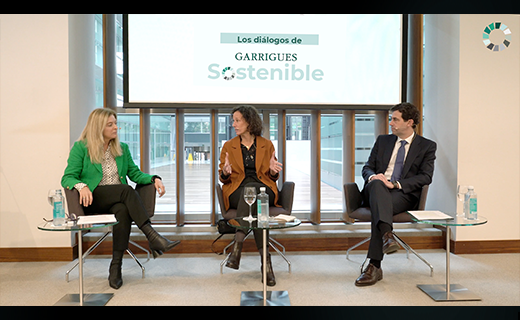The Garrigues Sustainable Dialogs: following the Paris Agreement, COP26 calls for action

In the latest of the Garrigues Sustainable Dialogs webinars, the director general of the Spanish Climate Change Agency, Valvanera Ulargui, has reviewed the conclusions of the 26th UN Climate Change Conference (COP26), in which she took part, analyzing outcomes versus expectations. She draws an optimistic conclusion.
COP26, held in Glasgow from October 31 to November 12, 2021, was billed as the most important conference since COP21, at which the famous Paris Agreement was reached. But was that really the case? In the latest Garrigues Sustainable Dialogs webinar, Valvanera Ulargui, director general of the Spanish Climate Change Agency, discusses the key takeaways from the summit, which in her opinion, lived up to expectations.
During her discussion with G-advisory partner Antonio Baena, and with Sonia Franco, Director of Communication and Marketing at Garrigues, acting as moderator, Valvanera Ulargui highlighted one of the most important messages to come out of the conference: “There is a clear commitment to working on compatible legal frameworks and standards for greenhouse gas emissions.” As she explained, this is important because the mainstay of climate conferences for the next few years is here: the framework for transparency and measurement, how countries where emissions are will report on them and using what criteria and what time frames. “It was very important for all countries to be take a uniform approach as regards greenhouse gas reporting,” she pointed out.
Call for action
“I think that COP26 was a genuine exercise in finding out where each country is at. The next step is to work to be credible,” explained Valvanera Ulargui. As she indicated, the Paris climate conference (COP21) was important because it was agreed that the vulnerability we were subject to was no longer acceptable.
COP26 arrived with this same agenda on the table and it was deemed that the rules drawn up in Paris were adequate but needed reviewing. “The success of COP26 has been to agree on milestones to drive decisive action within this decade in line with science,” stressed the director general of the Spanish Climate Change Agency: “In Glasgow, we started from the premises of greater solidarity and cross-sectoral cooperation (the call for action is not just directed at governments but also at businesses and the financial industry).” And for the first time at a COP, the overall goal of limiting future global warming to 1.5 degrees was reviewed and taken on, with the 2 degrees assumed in Paris being deemed to be insufficient. In short, the conference acknowledged that targets are not yet being met, but a plan has been drawn up, with greater transparency and rigor, broadening the base of players required to collaborate.
Valvanera Ulargui also stated that Glasgow had presented a financing plan to meet the US$100 billion a year target no later than 2023 and, more importantly, had discussed the need to promote new financial architecture as well as the role of the different instruments and institutions in mobilizing the billions necessary to move towards a carbon neutral economy, with a clear call to integrate the vulnerability variable into all public finance. “It is a substantial change,” she insisted.
The major role being played by the private sector
In her remarks, Valvanera Ulargui also highlighted the important role played by the private sector in combating climate change. In her words, “the business community and the private sector are one step ahead” in their climate commitments. By way of proof, she referred to the financial industry, which has already pledged to become carbon neutral in the coming years, with almost 130 billion dollars of private capital committed. Something which has also helped a lot, in her expert opinion, has been the EU green taxonomy and messages such as “we will not finance coal.” This is something Antonio Baena has experienced: “In the financial industry, we have seen a fundamental change”.
